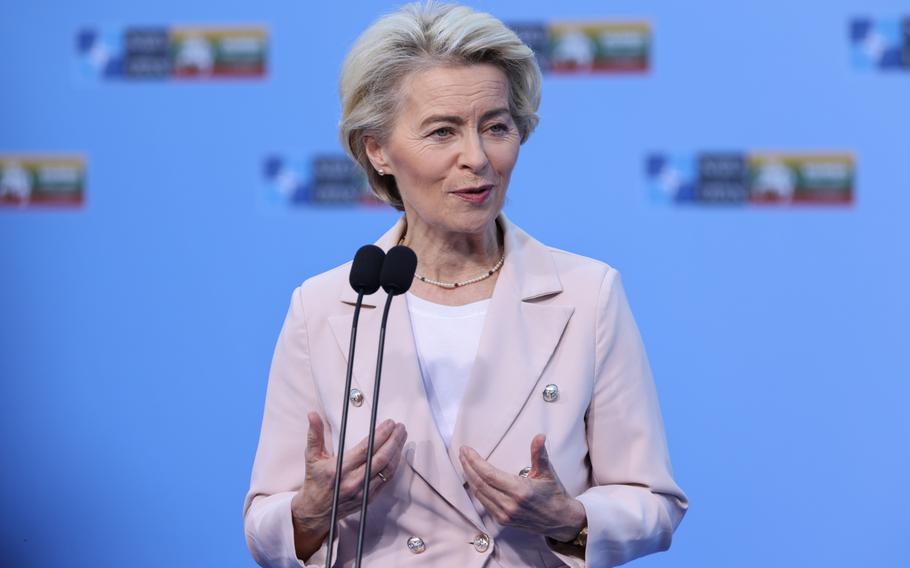
European Commission President Ursula von der Leyen. (Andrey Rudakov/Bloomberg)
BRUSSELS — The European Parliament on Wednesday voted in favor of a major migration deal, bringing the landmark legislation close to approval as Europe’s political center tries to fend off an ascendant far right ahead of key elections.
The package aims to overhaul the European Union’s approach to migration and asylum and resolve a long-standing source of tension: some E.U. countries doing more than others. It asks front-line countries such as Greece, Spain and Italy to build detention centers, speedily process claims and quickly deport unsuccessful claimants. Other countries are obligated to resettle more people or provide financial compensation — a provision known as a “solidarity mechanism.”
Final approval of the deal could come within weeks.
Since more than 1 million people sought refuge in Europe in 2015 to 2016, the E.U. has been struggling to find a common and effective approach to managing migration and asylum, with wide divides between those countries that opened their doors and those that slammed them shut. In recent years, anti-migrant sentiment has soared across the continent, and the far right has seized on it, pushing the issue into the political mainstream and narrowing that gap.
As the United States debates border control heading into the November presidential election, the issue is also dominating discussion in Europe ahead of E.U. elections in June. With far-right candidates leading in polls, E.U. negotiators were under pressure to deliver a deal — and they did.
The legislative package, known as the migration and asylum pact, took three years to negotiate and is being touted by Brussels as a major breakthrough. European Commission President Ursula von der Leyen called it “historic” and a “huge achievement for Europe.”
“After nearly a decade of blockade … it is done. Europe will manage migration in an orderly way, and on our terms,” Margaritis Schinas, a European Commission vice president overseeing migration policy, posted on X.
But the deal has faced fierce criticism from rights groups, which see it as a major setback for human rights, and from experts, who suspect it will do little to lower the number of migrant arrivals.
Wednesday’s vote was briefly interrupted by protesters who chanted, “This pact kills. Vote no!” The disturbance prompted the Parliament’s president to call for calm.
Though the pact has been pored over for years now, it is not clear how some of its key provisions will work. It is not immediately obvious, for instance, how the screening of asylum seekers will be streamlined without violating people’s rights, or how the new rules will help increase the proportion of people ordered to leave who are actually deported.
Human rights groups and refugee advocates are alarmed by the changes, including rules forcing children as young as 6 to provide biometric data.
“This agreement will set back European asylum law for decades to come. Its likely outcome is a surge in suffering on every step of a person’s journey to seek asylum in the E.U.,” Eve Geddie, director of Amnesty International’s European institutions office, said in a statement when the deal was struck. “From the way they are treated by countries outside the E.U., their access to asylum and legal support at Europe’s border, to their reception within the E.U., this agreement is designed to make it harder for people to access safety.”
The deal comes as various E.U. countries, notably France and Germany, move to the right on immigration and migration.
In December, as the E.U. migration and asylum deal was struck, the French Parliament adopted a bill that imposes tough rules on immigrants, notably making it harder for them to obtain benefits or for their children to become French citizens. The legislation was an effort to head off Marine Le Pen and her far-right National Rally party.
German Chancellor Olaf Scholz has vowed to take a tougher line as support for the far-right, anti-immigration Alternative for Germany (AfD) party is on the rise.
The new E.U. rules still must be approved by member states, though experts predicted that could happen relatively quickly, since political agreement has already been reached. From there, countries will need to figure out how to actually implement the measures.
“Now, it is all about the implementation,” Valérie Hayer, chair of the centrist Renew Europe political group, said in a statement. “Ultimately, the success of the reform hinges on how Member States put it into practice.”
E.U. officials on Wednesday vowed support for member states, as well as increased cooperation with countries along migrant routes.
The International Federation of Red Cross and Red Crescent Societies urged member states to tread carefully as they move forward.
“The Pact focuses on the normalization of detention and speedier processes at borders. Both are worrying. Detention damages people. Quick decisions can risk returning people who should be granted asylum,” the organization said in a statement.
“In the Pact’s implementation, E.U. countries must ensure the systemic use of detention is avoided at all costs, and that individuals are always treated as individuals,” the federation said.